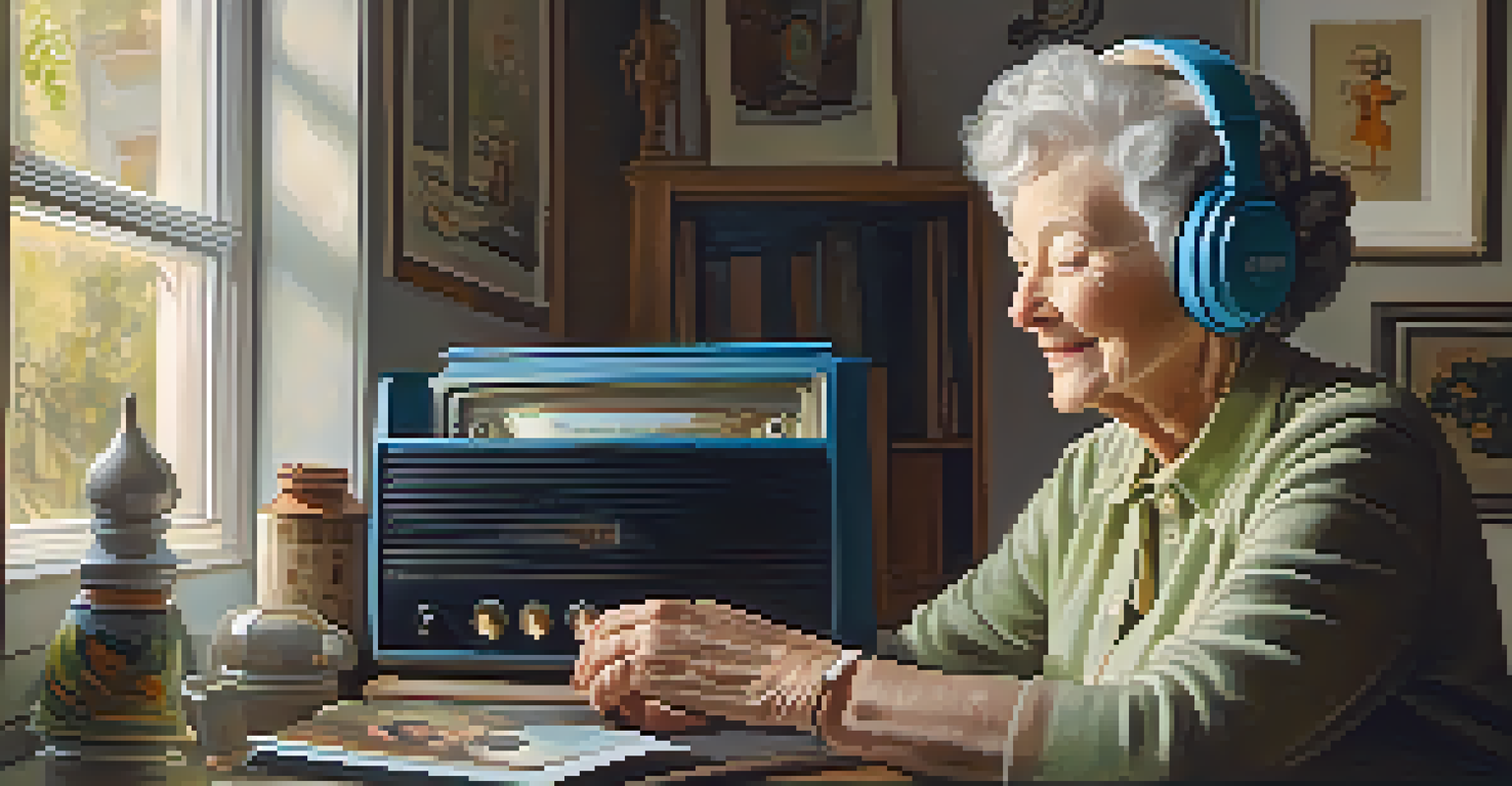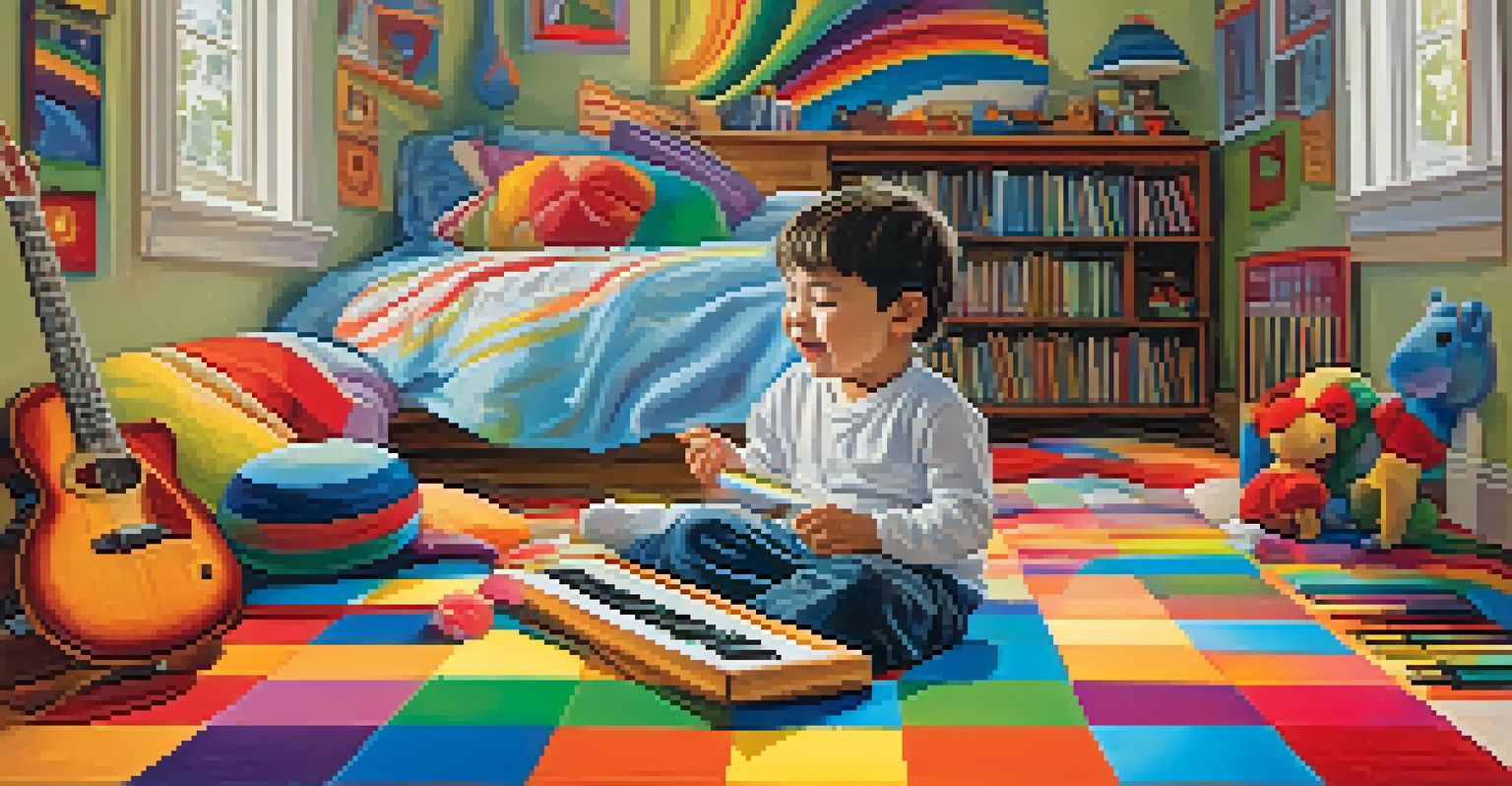How Music Therapy Facilitates Self-Expression in Individuals

Introduction to Music Therapy and Self-Expression
Music therapy is a clinical and evidence-based practice that uses music to address various emotional, physical, and social needs. It offers individuals a unique avenue for self-expression, helping them communicate feelings that may be difficult to articulate with words. By engaging with music, whether through listening, creating, or performing, individuals can explore their inner worlds in a supportive environment.
Music is the shorthand of emotion.
This therapeutic approach is not just for those with musical backgrounds; anyone can benefit. Imagine a shy child who struggles to share their feelings; through music, they can express joy, sadness, or anger without saying a word. This opens up a pathway for deeper emotional exploration and connection, making it a valuable tool for people of all ages and backgrounds.
As we delve deeper into the mechanisms and benefits of music therapy, we’ll highlight how it fosters self-expression, enhances emotional well-being, and encourages personal growth. Music has a universal language that transcends barriers, allowing individuals to connect with themselves and others in meaningful ways.
The Role of Music in Emotional Expression
Music has a profound ability to evoke emotions, making it a powerful medium for self-expression. For many, a particular song can transport them back to a moment in time, triggering feelings that were once dormant. This connection can help individuals articulate their emotions more clearly, whether it’s through the lyrics they resonate with or the melodies that move them.

For example, consider someone who has experienced loss. They might find solace in a haunting ballad that mirrors their grief, allowing them to process their feelings more effectively than through conversation. Music becomes a safe space where they can feel understood and validated, facilitating a healing process that words alone may not achieve.
Music Therapy Enhances Self-Expression
Music therapy provides a unique platform for individuals to express emotions that are often difficult to verbalize.
By harnessing the emotional power of music, therapists can guide individuals in exploring their feelings, leading to greater self-awareness and emotional clarity. This journey into music can help individuals articulate their inner experiences, paving the way for personal insights and emotional growth.
Creating a Safe Space for Self-Expression
One of the most critical aspects of music therapy is the creation of a safe and supportive environment. In this setting, individuals feel free to express their emotions without the fear of judgment or misunderstanding. This sense of safety is vital, as it encourages openness and vulnerability, which are essential for effective self-expression.
Where words fail, music speaks.
Therapists often use various techniques, such as improvisation or songwriting, to help individuals share their thoughts and emotions. For instance, a therapist might encourage a participant to create a song about their experiences, allowing them to convey complex feelings in a creative way. This process not only fosters self-expression but also builds confidence in their creative abilities.
Ultimately, the safe space provided in music therapy empowers individuals to explore their emotions deeply, leading to authentic self-expression. When people feel secure, they are more likely to uncover hidden feelings and express them in ways that resonate with their true selves.
How Music Therapy Encourages Personal Growth
Engaging in music therapy can significantly contribute to personal growth and development. As individuals explore their emotions through music, they often discover new aspects of themselves, which can be enlightening and transformative. This process can lead to increased self-esteem and a deeper understanding of one's identity.
For example, someone who has always struggled with self-doubt may find empowerment in writing and performing their own songs. As they share their music with others, they receive positive feedback, which reinforces their sense of self-worth. This journey of self-discovery through music can be incredibly rewarding, as it fosters a greater sense of agency and confidence.
Safe Environments Foster Openness
Creating a supportive space allows individuals to explore their feelings without fear of judgment, promoting genuine self-expression.
Moreover, personal growth in music therapy often extends beyond the individual. As people express themselves creatively, they may also inspire others to embark on their journeys of self-exploration, creating a ripple effect of empowerment and self-expression within communities.
Music Therapy Techniques for Self-Expression
There are various techniques used in music therapy that facilitate self-expression. These techniques can include songwriting, improvisation, lyric analysis, and even music listening exercises. Each of these methods provides a different pathway for individuals to explore and communicate their emotions.
For instance, songwriting allows individuals to craft lyrics that reflect their experiences, serving as a cathartic outlet for their feelings. On the other hand, improvisation invites spontaneity, encouraging participants to express themselves in the moment without overthinking. Both techniques can be incredibly liberating, allowing for a more authentic expression of one’s feelings.
By incorporating these diverse techniques, music therapists can tailor sessions to meet the unique needs of each individual, promoting a personalized approach to self-expression. This flexibility is essential, as it allows individuals to engage with the therapeutic process in a way that feels most comfortable and effective for them.
The Impact of Music Therapy on Different Populations
Music therapy is beneficial across a wide range of populations, from children with developmental disabilities to elderly individuals dealing with dementia. Each group can harness the power of music to facilitate self-expression in ways that are unique to their needs. For example, children may use music to communicate feelings they struggle to articulate verbally, while older adults may reminisce through familiar melodies.
In settings like schools, music therapy can enhance social skills and emotional regulation among children, allowing them to express themselves and connect with peers. In contrast, elderly individuals may find comfort in music that evokes memories, helping them express feelings of nostalgia or sadness in a safe manner. This adaptability makes music therapy a versatile tool for promoting self-expression across diverse age groups and backgrounds.
Personal Growth Through Music
Engaging in music therapy can lead to significant personal development, empowering individuals to discover and articulate their true selves.
By understanding the unique needs of different populations, music therapists can tailor their approach, ensuring that everyone has the opportunity to express themselves meaningfully. This inclusivity is a testament to the universal appeal of music as a medium for communication and emotional exploration.
Conclusion: Embracing Self-Expression through Music Therapy
In conclusion, music therapy serves as a powerful catalyst for self-expression, enabling individuals to articulate their emotions in ways that feel safe and authentic. By leveraging the emotional depth of music, people can explore their inner landscapes, leading to increased self-awareness and personal growth. Whether through songwriting, improvisation, or music listening, the opportunities for expression are endless.
As we continue to recognize the importance of mental health and emotional well-being, music therapy stands out as a valuable resource. It not only empowers individuals to express their feelings but also fosters connections with others, promoting a sense of community and understanding. In a world where communication can sometimes feel daunting, music offers a universal language that speaks to the heart.

Embracing music therapy can lead to transformative experiences, helping individuals navigate their emotions and find their voices. So, whether you're a seasoned musician or someone who's never picked up an instrument, remember that music has the power to heal, connect, and inspire.